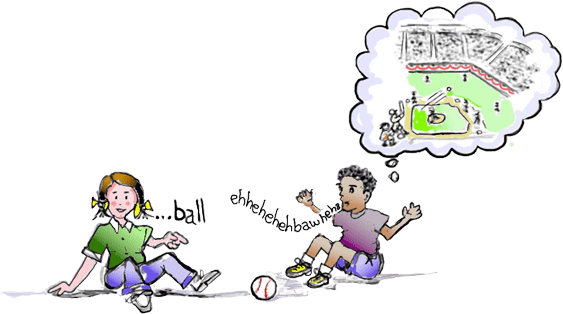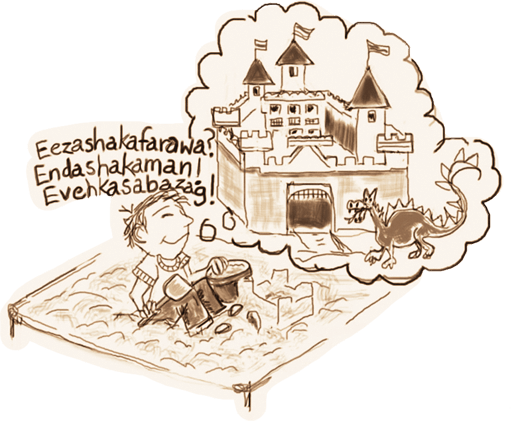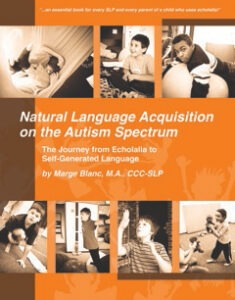Citations:
The Units of Language Acquisition- Ann Peters 1983, 2021; https://communicationdevelopmentcenter.com/Language Acquisition and Communicative Behavior in Autism: Toward an Understanding of the ‘Whole’ of It-Barry Prizant, 1983; https://barryprizant.com/

Citations:
Finding the Words: To Tell The Whole Story- Marge Blanc 2005;
https://communicationdevelopmentcenter.com/
Natural Language Acquisition on the Autism Spectrum: The Journey from Echolalia to Self-Generated Language- Marge Blanc 2012
Citations:
Finding the Words: To Tell The Whole Story- Marge Blanc 2005;
https://communicationdevelopmentcenter.com/
Natural Language Acquisition on the Autism Spectrum: The Journey from Echolalia to Self-Generated Language- Marge Blanc 2012

Language heard in one situation and used in another. This language can be songs, sentences, scripts, or parts of media.
ABCDEFGHIJKLMNOPQRSTUVWXYZnowIkno wmyabcsnexttimewontyousingwithme
Ifyourehappyandyouknowit Happybirthdaytoyou
——
(a) Let’s get out of here!
(b) Want some more?
Language gestalts are part of the experiences of life. These could be lived experiences or those enjoyed via media. They carry personal meaning, often emotional, and should not be interpreted literally.
Language from Stage 1 is broken down into smaller parts, which are then combined in new ways.
ABCD + to you
You’re happy + with me LMNOP + you know it —
——
(a) Let’s get + out of here! Want + some more?
(b) Let’s get + some more? Want + out of here!
ABCDEFGHIJKLMNOPQRSTUVWXYZnowIkno wmyabcsnexttimewontyousingwithme
Ifyourehappyandyouknowit Happybirthdaytoyou
——
(a) Let’s get out of here!
(b) Want some more?
Mitigations are further broken down into single words that are combined without grammar.
(a) Get…more!
(b) Want…out?
——
Ball + red, Blue + ball, Table + chair, Up + ball, Red + blue, Table + under, Here + there, Mom+ home, Home + me, Me + Mom, Outside +tree, Tree + leaf, Rock + mud, Water + duck, Fast + car, I + fast, It + good, I + OK, OK + you?
‘Get…more!‘ and ‘Want…out?‘ demonstrate emergence into Stage 3.
——
Stage 3 presents the opportunity to increase single word vocabulary and explore two-word combinations of nouns, attributes, and locations.
Self-genThe child is experimenting with meaningful word combinations and emerging grammar.
Get up, Mom.
Mommy, need up.
Got milk snack?
I play friends now!
All my friends are playing outside!
We need milk and cookies for our snack.
Early phrase types and combinations.
Emerging grammar.
All basic grammatical structures
(pronouns, verbs, conjunction ‘and’).
The child is adding more advanced grammar to their basic sentences.
Can you help me with my homework?
Why doesn’t this work?
I want to go outside because my friends are waiting.
All basic conjunctions.
More advanced verb tenses.
More advanced sentence structures.
The older child is using sophisticated grammar correctly.
I have to finish early but I don’t want to
make any mistakes.
If I can’t find the answer, do you think we
could google it?
Before we make a decision, we should
review what the teacher was asking for.
All advanced verb tenses, conjunctions, and clauses needed to participate in a growing number of academic situations.
Resources:
Take the time to see what the child is doing: Watch and listen; provide plenty of silence
Comment on what you and the child are doing
Follow the child’s lead in play and interests (all are opportunities to learn and grow)
Consider co-regulation always
Honor the child’s play by
joining in or
‘parallel-playing’
Treat every interaction as an equal opportunity for language development
Earn the child’s trust and focus on your connection. Only then does your language matter
Understand that
language development ‘in
context’ is already
‘generalized’
Keep your connection with the child–it’s a privilege
Remember that every child’s play is
different and legitimate
Think about the variety of functions the child is communicating
Use the child’s language and support it becoming more flexible
Pay attention to each expressed thought, discover the meaning and honour the communicative intention
Respond to the child’s own language
Provide language models that the child can use later without changing them
Allow the child to make new language
‘their own’
Treat all communication types as valid (gestures, AAC, singing, signing, intonation, etc.)
Gestalt thinkers process life experiences as gestalts
Adopt a flexible
and supportive communication
style
Add personal language to robust AAC systems

The Journey from Echolalia to Self-Generated Language, Marge Blanc, M.A., CCC-SLP
“This is the language course we missed in school”
Leslie W., M.A., CCC-SLP
“This is the language course we missed in school”
– Leslie, M.A., CCC-SLP
Donations appreciated!
“This is the language course we missed in school”
– Leslie, M.A., CCC-SLP
Here are the Communication Development Center Policies that we all probably agree on, because we care about our clients, potential clients, and their families. We want to remind everyone that we are not in competition with one another, rather as a team spreading our neurodiversity mindsets and providing Gestalt Language Processing and Natural Language Acquisition expertise with the world. We want potential clients to know who we are as professionals, but we don’t want to appear to be competing or end up competing with each other. We are all in this together, all learning, and all capable of learning more along with our clients and families, no matter how experienced or well educated we are.
We also presume that we are all SLPs, SLTS, SLPAS, CDAS, and not BCBAs and RBTs. We also presume that we are all ND-affirming, not compliance-based, use child-led therapy, are family focused, and acknowledge the principles of child development and the development of self-regulation.
Each of us is proud of the courses we’ve taken, readings we’ve done, in services we’ve provided in our school or clinic etc… but we’re not in competition with each other so our policy is to respect that our comment section reflects collegiality.
Here are some examples that might illustrate what families would be looking for:
Since our goal is to both reflect your practice as you want to reflect it and maintain the collegiality we mentioned earlier, we will contact you if we feel that an edit to your listing would better reflect those values.